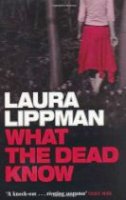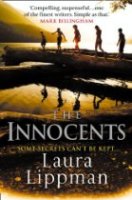Laura Lippman is the multiple award-winning best-selling author of (currently) eleven books in the acclaimed private investigator Tess Monaghan series and six New York Times bestselling standalone novels. Her most recent book published in the UK is The Innocents (The Most Dangerous Thing (US)). She has won numerous awards for her writing including the Anthony, Edgar®, Shamus, Macavity, Nero, Barry and Agatha Awards to name a few! Her books are published all over the world to great acclaim. Laura attended Harrogate Crime Festival 2012 earlier this year and ever since my first interview with her back in 2004 we have been friends. I managed to persuade her whilst she was on tour in the US for her new book And Then She Was Good to answer a few questions and talk about her catalogue of work.

 |
The last time I interviewed you was at Harrogate back in 2004 and Every Secret Thing had just been released. It was the first non- Tess book that you had written and it questioned life, justice and vengeance and the different ways in which we fail each other especially our children. It received rave reviews from all over the place and won the Barry Award. How pleased were you with the response that you received about it especially since it was your first standalone novel.
Every Secret Thing was the first book I wrote after leaving my fulltime job and I just felt so validated. Because I had managed to write seven books in seven years while working fulltime, it never occurred to me that it would be so amazing to have the luxury to focus exclusively on my books. If I had any doubt (not much) that leaving the paper was the right thing, I didn’t after Every Secret Thing was published.
|
 |
To The Power of Three is another of your standalone novels, which also involves children, inthis case three young girls where you explore a longstanding friendship in flashbacks and the incident that took place at school along with its repercussions. What gave you the idea for the storyline and whilst you were writing, did it take you back to the friendships you made at school?
Three was inspired by a story I had written for an anthology in which every story had to center on a gun. I wanted to write about a kid bringing a gun to school, but not a “school shooting,” if that makes sense. Originally, I thought the girl would be someone on the very bottom of the pecking order. But as I thought about it, I realized high school, as I remembered it, wasn’t quite that sharply delineated between losers and winners. There were a lot of kids in the middle and they could be astonishingly cruel, then astonishingly kind. The girls share a lot of my own story, although I wasn’t part of a gang of three. Perri is probably the one closest to me, except for the righteous anger. But I tended to be the smart friend to beautiful golden girls.
|
 |
What The Dead Know was short-listed for the Crime Writers Association Dagger. It also won the Quill Award and an Anthony Award for Best Novel. Bearing in mind the fact that you have won every single major crime fiction award going aside from a Dagger, do you still feel a sense of surprise when your books are shortlisted for awards and how important are they to you?
The early nominations and (sometimes) awards were probably helpful to my career. Singled me out, got me some attention, although that’s not always enough. The Edgar list has plenty of people on it who were never heard from again. Now, when word of a nomination comes, it’s like finding out that I’m getting a nice royalty check from some country where I didn’t even know my books were sold. Only it’s in public, so people send me nice notes and it’s nice, nice, nice, and then the sun goes down and the sun goes up and it’s a new day. Then the award ceremony comes and one wins, or loses, and if it’s a win, then it’s nice, nice, nice, and if it’s a loss, it’s surprisingly not bad at all and the sun goes down and the sun comes up and it’s another day at the writing desk.
|
You seem to be alternating between writing a Tess novel and a standalone. Was this a conscious decision and does it help you look at Tess with a fresh eye when you come back to her?
It was a very conscious decision to alternate and I thought the Tess books really benefited, as did I. Not so much a conscious decision to stop writing about Tess, however. I haven’t written anything but a short story about her since 2008, have done four stand-alones in a row now. That wasn’t a plan.
 |
The last Tess book that you have written so far is The Girl in the Green Raincoat. It is very much in my opinion an homage to the Hitchcock film Rear window was this intentional and did this have anything to do with what was going on in your life at the time?
An homage to Rear Window and Daughter of Time and something else that I just realized the other day, then just forgot. Seriously. Oh – the Nero Wolfe series because Tess is “desk-bound” in a way and has to rely on various Archie’s. I did write it while hoping I was going to be a mother, but without any idea when that might happen and also no idea that it was going to happen differently than planned.
|
A number of the topics that you deal with in I’d Know You Anywhere are acts of terror, specifically kidnapping and rape. You manage to write about terror very well indeed, to the extent that when I was reading I’d Know You Anywhere there were times I had to put the book down for periods at a time. Did you find it difficult writing about these issues and how did you deal with them to get over the brutality of the events that took place.
Yes, I do find it hard. I found it loathsome to write from Walter’s pov in that book. He’s a horrible person. But I had to know how he saw things, I had to try and see the world as he saw it. He is based on a real-life killer, albeit a paedophile, who believed that it, was society’s fault that he killed his victims because society refused to condone his desire to have sex with under-age boys. Walter honestly believes he is a normal person, who wants what others want. I’m creeping myself out just writing about him here.
 |
In The Innocents (which is known as The Most Dangerous Thing in the US), you employ first person plural for part of the novel. It works extremely well. Was this a deliberate plot ploy and did you find it difficult?
Glad to know it worked for you. Some readers were put off by it. But it was right because the whole point of the story is that they share it and they are telling it, as a group, in adulthood, informed by so much terrible knowledge and sadness. And, yes, it was difficult. It would have been so much easier to write the novel in a traditional way, but it wouldn’t have fit.
You have gone on record as saying that this is your most personal novel to date, what made you decide to write this and has it made you look at your own childhood with a different and possibly more critical eye?
|
Geographically personal. I returned to the place where I grew up, which I think of as idyllic – still do – and thought, for the first time, about the adults I knew. Not my parents’ generation, so much, but the parents for whom I baby-sat, the not-quite baby boomers or the very first baby boomers, who were married and settled just as the 60s got interesting.
The Innocents is a very multi-layered story. It is also a complex interwoven tale of lies and secrets that left me pondering just what happened, why it happened, and just who was at fault. It is about lost innocence. How difficult was it for you when you were writing this novel to ensure that the reader was not overwhelmed?
It was a tough novel to write. I was often overwhelmed. I feel as if the section about the parents took years to write. I also was aware that it moved slowly, that it had this very deliberate pace that it was almost an anti-thriller. I guess I felt that if I could get a handle on it, the reader would be able, too.
Looking at your standalone novels as a whole there is a thread that runs through all of them and that is children, from all different angles. Whether it be children that have become adults and looking back on events, repercussions of things that happen in childhood that leak into adulthood, the shattering of a child’s innocence, the things a parent will do to protect their child? And so forth. What has drawn you to this particular milieu? Has this made you look at childhood in general in a different way?
A therapist I know once said that traumatic events “freeze” us at certain ages. I didn’t experience any real trauma in my youth, but I seem to be forever fourteen – on the cusp, face pressed against the glass, awkward. I’m not sentimental about kids. They are frequently awful to one another. But there’s an innocence in their worst behaviour and a lack of guile.
You now split your time between Baltimore and New Orleans how do you manage to organise your writing in two different places and do you miss each place when you are not there?
Hooray for laptops and the “cloud.” Have laptop, can write anywhere. In Baltimore, I have an office. In New Orleans, I have a little desk in a corner of the kitchen. And I have neighbourhood coffee houses in both cities, so I’m in good shape.
When next will we see the return of Tess?
I don’t know when, I only know we will. I’m not going to rush her. The right story hasn’t occurred to me yet.
Now that you have your daughter to whom The Innocents is dedicated has she changed the way in which you write and if so how?
It changes everything, but then, everything changes everything. I have fewer hours in the day. I have greater appreciation for what all parents do. Cliché alert, but I get to experience things as if for the first time, see the world afresh. But it doesn’t really change the way I write because everything is still up for grabs.
What is the question that you have always wanted to be asked and have not been? What would your answer be?
I would like people to ask about how my friend Lizzie did a wardrobe intervention on me and then I would like to bore everyone silly with a description of my closet.
More information about Laura and her work can be found on her website.
Main photo © Ali Karim 2004
women that cheat
online wife cheated
cheats
site why women cheat in relationships
viagra 200mg
read thyroxine
coupons for prescription medications
click pfizer viagra coupon
discount prescription drug card
link free discount prescription cards
information on abortion
read abortion hotline
adalat oros
adalat adalat oros
pill for abortion
open costs of abortion